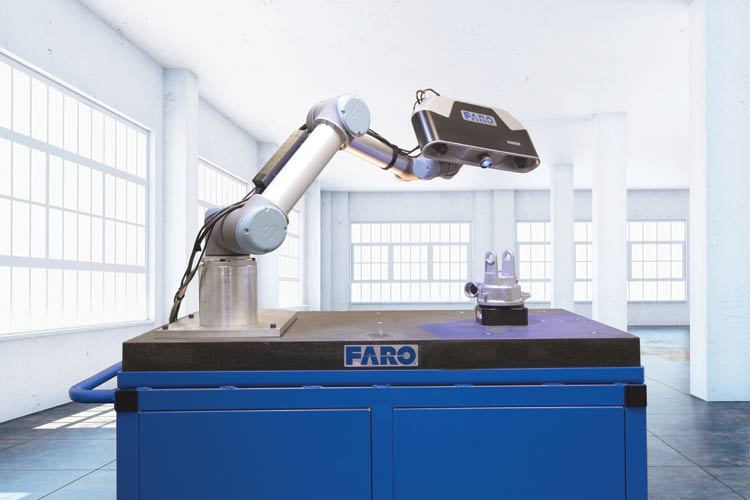The metalworking industry has always placed great emphasis on having tools that can increase measurement accuracy, help with quality control, support reliability, and that can support the objective of ‘making it right the first time’. However, as manufacturers attempt to grow their trade in the global business environment, the need for measurement accuracy has become an even higher priority due to the time- and cost-savings that businesses can potentially achieve.
3D measurement solutions for the metalworking industry have been available for some time now. Some common applications that make use of these advanced technologies include Parts Inspection, Alignment, Reverse Engineering, and Dimensional Measurement. All four categories are similar in the way that their need for measurement and documentation accuracy is tightly woven into each of their core activities. To elaborate, measurement accuracy is widely agreed to be a most important aspect in mechanical parts inspections. Machine misalignment on the other hand can delay an entire manufacturing line. Reverse engineering, essentially a measurement and documentation process, requires a high degree of accuracy, and of course, dimensional measurement goes hand-in-hand with measurement accuracy.
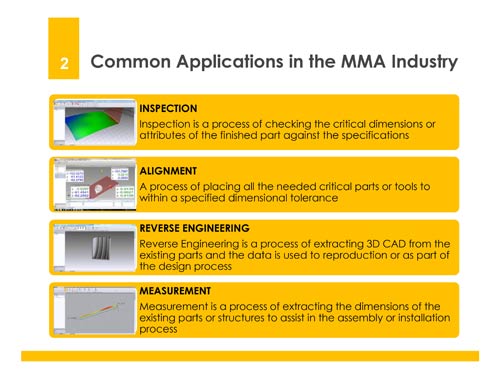

As the demand for measurement and documentation accuracy grows, it is likely that traditional tools such as handheld calipers will eventually be phased out and replaced by advanced laser scanning and 3D measurement solutions. Here, we identify four factors driving this need for accuracy.
Need for Greater Operational Precision
Naturally, manufacturers need to ensure that their measurement and documentation objectives are met. With the right 3D metrology equipment, manufacturers can be one step closer to gaining tighter size tolerances, achieving precisely calculated designs, and securing built-in form deviations to assure maximum measurement accuracy.
Application – Inspection & Reverse Engineering
Manufacturers can employ several metrology methods to meet these measurement objectives. The FARO Cobalt Array 3D Imager is a new device that supports metalworking manufacturers in this aspect. A metrology-grade, non-contact scanner, the Cobalt Array is capable of providing manufacturers with reliable and accurate 3D scan data within an automated or manual workflow. With no restrictions on the number of sensors in an array, the Cobalt Array enables the expansion of field of views to scan wider areas, improves the inspection time, and achieves greater productivity. The device’s high resolution, automatic exposure, and high dynamic range enables consistent and more accurate measurements, even when it comes to complex
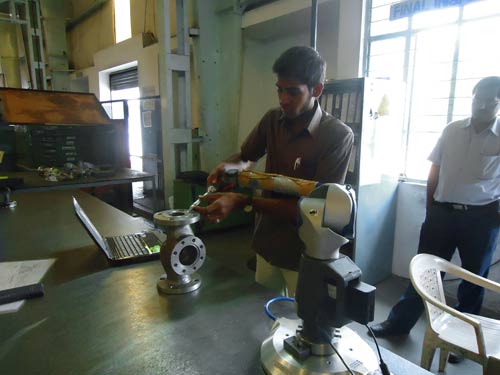
components with finer details. An ideal device for quality inspection and reverse engineering applications, the Cobalt Array is a unique fusion of technology that emphasizes accurate scanning results.
Separately, the FaroArm is another tried and proven tool by the metalworking industry that promises superior operational precision. Flow Link Systems (FLS) – a casting and valve component supplier based in Coimbatore, India – places great emphasis on quality and customer satisfaction. Both of these attributes were push factors that steered FLS to purchase the FaroArm, providing the manufacturer with an immediate increase in measurement accuracy levels. From formerly working with up to 30 microns’ tolerance using handheld tools and templates, the FaroArm improved FLS’s measurement accuracy to a tolerance level of about 24 microns. With the FaroArm, FLS is now able to obtain accurate measurements for concentricity and cylindricity tolerance in half the time that was previously spent.
The Cobalt Array and the FaroArm are just two examples of how advanced 3D metrology measurement and documentation solutions can aid manufacturers in achieving accurate measurements and scanning results. With a reliable yet portable coordinate measuring machine, manufacturers can easily verify product quality through performance assessments including 3D inspections, tool certifications, and computer-aided design (CAD) comparison.
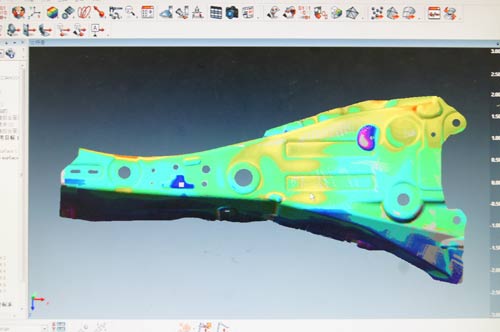
Need for Accurate Reporting
Today, it is common for industrial suppliers to require accurate reporting of dimensional information for statistical analysis, and to safeguard quality processes. These reports can present measurement data clearly and unambiguously, allowing manufacturers to add comparison data or reproduce data for possible correction of components and production parameters. With ever-increasing quality demands, companies are under pressure to invest in innovative solutions that can support instantaneous and accurate quality reporting on first-article and production inspection, as well as to ensure supplier quality management.
Application – First-article, Production, and Quality Inspection
Yanmar, a Japanese diesel engine manufacturer, is another satisifed FaroArm user. As the nature of Yanmar’s research projects required 3D measurement, Yanmar introduced the portable FaroArm to provide technical support. Even when used by different operators, the FaroArm achieved the same measurement accuracy, allowing Yanmar to secure the same level of quality control across departments. Since then, the manufacturer has used the FaroArm for product and quality inspection, amongst other uses.
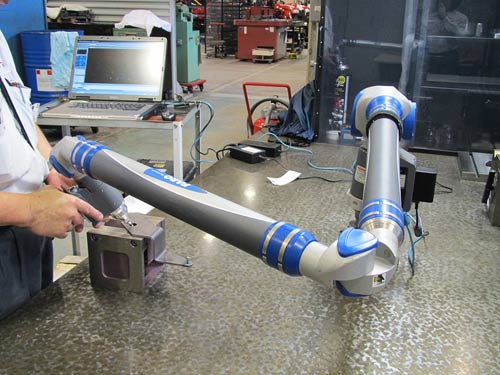

The FaroArm does not only provide highly precise measurements, but also conducts
first-article, production, and quality inspections extremely well. The handy metrology device is also widely known for its effortless ability to generate reports. The FaroArm is able to determine and record the location of a probe in 3D space before reporting the results through software, allowing manufacturers to compile a database of scanned data measurements.
For hard to reach areas or narrow spaces, the FARO Scanner Freestyle3D is an ideal high quality handheld scanner that aids in free-form components inspection. The Freestyle3D incorporates state-of-the-art scanning technology with enhanced scanning accuracy of 1mm at a 1-meter range, and features a traceable calibration accessory that can provide manufacturers with verifiable data accuracy. The device can be easily calibrated on-site to generate high quality data in PDF format for easy reporting of measurement information.
Need for Lean Manufacturing
Lean thinking or lean manufacturing is an efficient concept, pioneered by Toyota, to shorten the time spent between manufacturing stages. The process is largely centered on manufacturing products on demand through a technique called pull production. Manufacturers then develop products only when required, eliminating unnecessary wastage, ultimately achieving both time- and cost-savings. In order to manage pull production, measurements need to be made dimensionally correct from the start to avoid time delays for rework. Measurement accuracy is therefore of paramount importance in lean manufacturing.
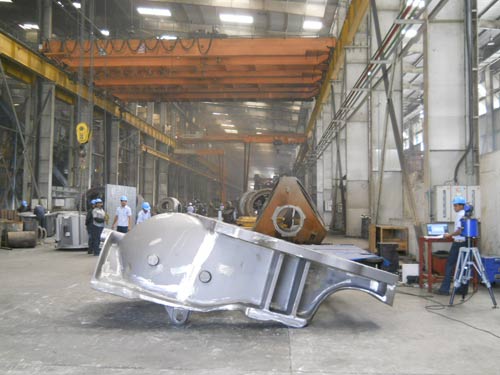
Application – Hot Forging & Mobile Inspection
Within the metalworking industry, hot forging processes are popular due to the advantages of increased ductility, strain hardening of metal part elimination, and reduced material strength. However, retrieving accurate measurements from hot forging operations can be challenging as the high temperatures make it difficult for sensors to label characteristic points. Manufacturers are therefore beginning to prefer non-contact measurement systems that offer a long range, in order to take measurements of hot work pieces at a distance.
There are several devices now available that can efficiently support manufacturers as they carry out hot forging processes. The FARO Laser Scanner Focus3D is one such solution. An ideal instrument for 3D modeling and documentation, the Focus3D’s non-contact dimensional measurement ability, as well as its large and flexible measuring scope, makes the device particularly suitable for some manufacturers. Additionally, the point cloud data obtained by the device can be quickly converted to 3D CAD data, enabling the direct creation of 3D design drawings, effectively shortening entire workflows for lean manufacturing.
When it comes to mobile inspection, FARO’s analysis has shown that for dedicated inspections of large products or assemblies, a fixed multiple imager array of Cobalt sensors will be faster, more easily integrated, more affordable, more accurate, and easier to maintain when compared to robot-based imagers or laser line systems. In this sense, the Cobalt Array directly supports the concept of lean manufacturing, as more accurate dimensions can make a world of difference in time-pressed manufacturing environments. The FaroArm is yet another advanced metrology device that has won much favor amongst metalworking manufacturers. User-friendly, accurate, and fast, the FaroArm helps to boost overall productivity, and can be utilized for immediate mobile inspection onsite, facilitating uninterrupted production during inspection.
Need for Work Place Health & Safety Practices
Working with machinery can be dangerous as operators are exposed to risks that may lead to bodily injuries. Safety and control measures therefore need to be integrated in order to create and maintain a secure working environment. As government bodies continue to regulate in favor of safe working practices to minimize or eliminate worker injuries, manufacturers are responding by taking greater precaution towards protecting their manpower resources.
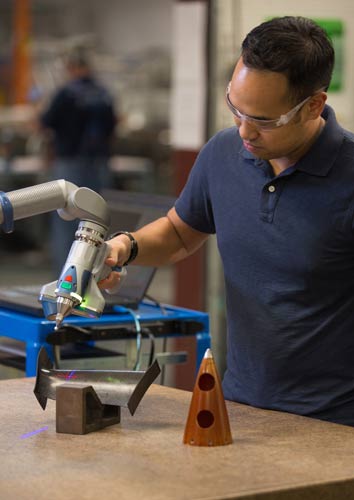
Application – In-line Inspection
When working with fixed coordinate measuring machines (CMMs), bulky and heavy parts need to be moved from the shop floor to measuring rooms. This is potentially hazardous if not managed properly, as the activity compromises on workers’ safety. The portability feature across FARO’s range of 3D measurement and documentation solutions directly addresses this concern, as FARO devices can be brought to the parts for measurement instead. The ability to perform in-line inspections enables employees to conduct measurement assessments safely, and also provides manufacturers with better accuracy and time-savings.
The Solution that Keeps on Giving
Why then should manufacturers consider 3D metrology tools? Comparatively, 2D tools are less capable of providing the type of precision support that is needed by the metalworking industry. Although the latter is able to define measures such as distance, diameter, and area, the results provide only a rough estimation at best. The difference in measurement quality between 3D and 2D tools is also especially evident when the spotlight is on measuring complex shapes, or for direct comparison to CAD files. Furthermore, when used by different employees, the limitations of 2D tools become more pronounced, as variations in measurement results are often recorded between operators, showing a lack in reliability.
The old adage, “you get what you pay for”, holds true. Some degree of capital investment needs to be made for greater measurement accuracy. At the end of the day, top manufacturers place great importance on producing quality products in the most efficient manner. 3D measurement and scanning tools are proving to be some of the most optimum solutions for the metalworking industry. They are, therefore, worthwhile investments that pay for themselves when it comes to time- and cost-savings in the long run.
By Mr Eddy Lek, Product Marketing Manager, Asia Pacific, FARO Technologies

